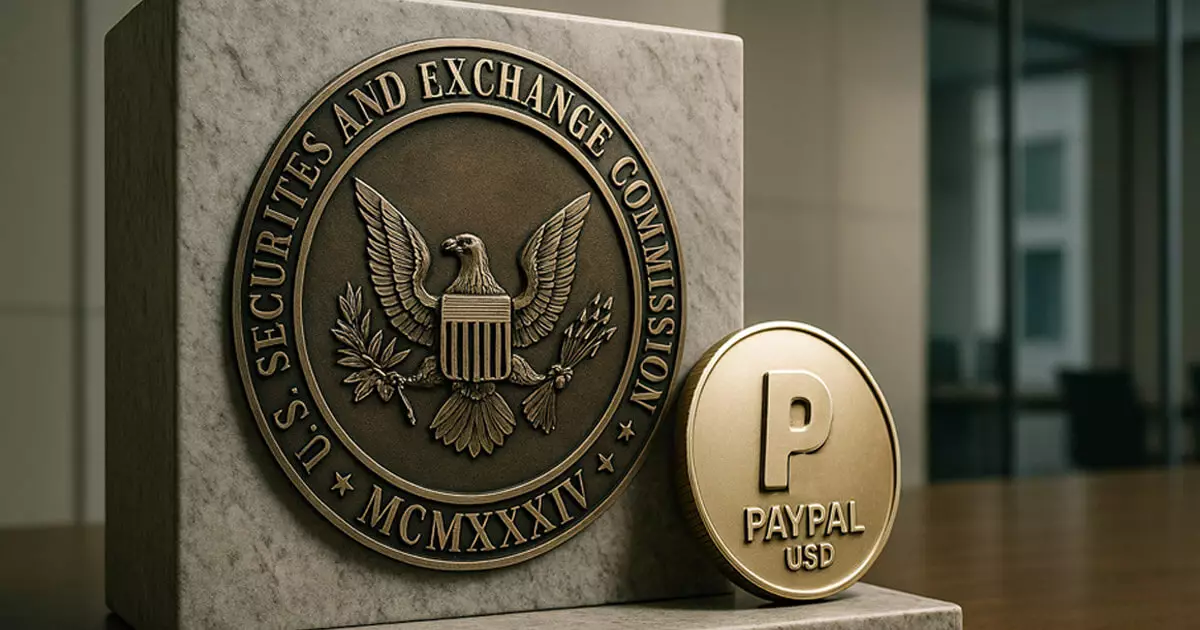In an unexpected turn of events, the U.S. Securities and Exchange Commission (SEC) has opted to conclude its investigation into PayPal’s dollar-backed stablecoin, PYUSD. This decision is not merely a footnote in regulatory history; it indicates a subtle yet significant shift in the regulatory landscape for stablecoins. Faced with former SEC Chairman Gary Gensler’s often aggressive stance that categorized numerous digital tokens as securities, this retreat opens up new avenues for innovation and development within the fintech space.
The closure of the inquiry signals more than just a lack of enforcement; it conveys a broader message that not every stablecoin is a target for harsh regulatory scrutiny. The emergence of PYUSD as a legitimate and compliant player in the market is bolstered by this newfound clarity. Without allegations of specific violations, both PayPal and Paxos can move forward without the looming threat of legal complications, enabling them to focus on enhancing the adoption of their product.
A Step Towards Legislative Progress
Interestingly, this decision may also invigorate conversations surrounding the GENIUS Act, a bipartisan initiative aimed at establishing a separate regulatory framework for payment stablecoins. This proposed legislation seeks to create a licensing system for stablecoin issuers, enforce strict capital reserves, and demand regular disclosures, effectively bringing some much-needed structure to a fragmented regulatory environment.
A well-defined regulatory pathway carries immense potential benefits. It could allow competent players like PayPal and Paxos to innovate under clear guidelines, fostering an environment ripe for growth. While some may argue against additional regulations, the reality is quite the opposite: clarity fosters trust among consumers and investors alike.
Shaping the Payments Landscape
PayPal, with its introduction of PYUSD, positions itself at the forefront of the digital payment revolution. With a circulating supply of approximately $879 million and plans to integrate this stablecoin across its vast user base—including over 20 million small businesses—PayPal is orchestrating a shift from traditional card networks to more efficient stablecoin-based payment systems. This strategy not only improves transaction efficiency but also significantly reduces costs for small businesses that often encounter prohibitively high fees associated with traditional banking solutions.
Moreover, the ability to settle payments with PYUSD throughout 2025 allows PayPal to build native payment rails that seamlessly integrate digital currency with everyday transactions. This strategic pivot is indicative of PayPal’s vision to be more than just a payments processor; the company aspires to become a catalyst for the broader adoption of cryptocurrency in everyday commerce.
Custody and Legal Implications
However, as PayPal ventures deeper into the realm of digital assets, the specter of custodial risks continues to loom large. Despite the promising outlook for PYUSD, PayPal openly acknowledges the uncertainties linked to the custody of digital assets. Their risk disclosures caution users that their funds may not enjoy the same bankruptcy protections as traditional currencies, potentially leaving them vulnerable in the event of insolvency.
This acknowledgment of risk is a level of transparency that is crucial in building consumer trust. By being upfront about potential pitfalls, PayPal not only positions itself as a responsible player in the highly volatile crypto market but also educates consumers to take a more nuanced view of their asset management decisions.
Moving Beyond Enforcement
The SEC’s decision to withdraw from pursuing enforcement action against PYUSD is indicative of an evolving attitude toward stablecoins. Rather than relying primarily on enforcement as the means of establishing rules, it seems we may witness a gradual emergence of guidelines crafted by Congress itself. This shift renders the regulatory dialogue more collaborative and potentially lowers the antagonism that often colors interactions between regulators and industry innovators.
The SEC’s recent clarification that a specific subset of USD-backed stablecoins is not classified as securities under federal law is a glimpse into a more rational approach to oversee this sector. While this clarification doesn’t fully alleviate uncertainty surrounding all stablecoins, the absence of overt SEC aggression provides breathing room for the entire industry, allowing it to evolve without the persistent threat of litigation.
This new regulatory approach empowers innovators like PayPal while diminishing the oppressive atmosphere that often hovers over emerging technologies. In doing so, it creates a fertile ground for ideas that could redefine financial transactions as we know them. As we continue forward into this dynamic landscape, PayPal’s PYUSD may very well be the stepping stone to a more stable and regulated future for cryptocurrencies.



















Leave a Reply